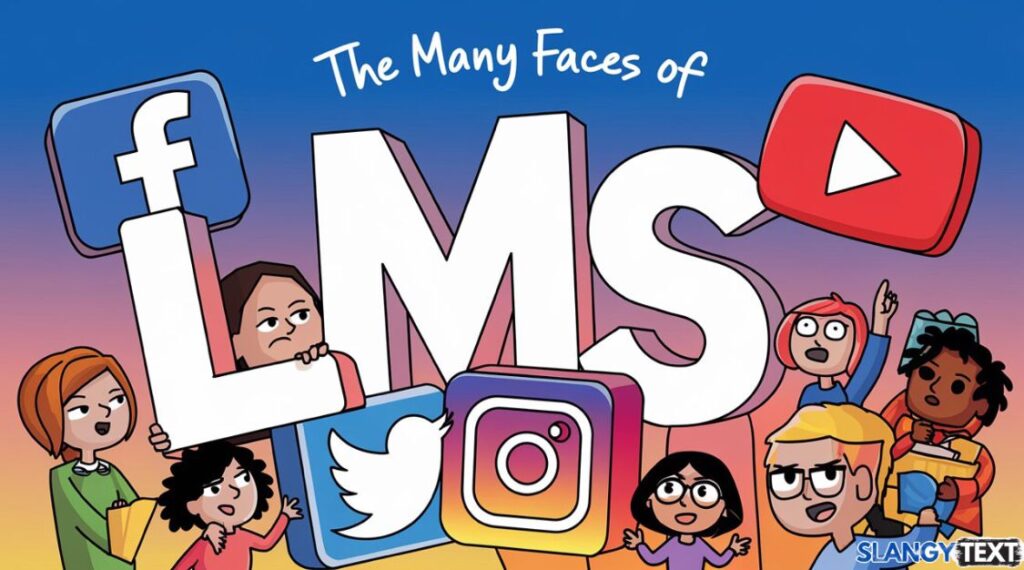In today’s fast-paced digital world, acronyms and shorthand have become an integral part of our daily communication. One such acronym that has gained popularity, especially in the realm of social media, is LMS.
This seemingly simple three-letter combination carries multiple meanings and interpretations, depending on the context in which it’s used. Let’s dive deep into the world of LMS and uncover its various facets.
The Primary Meaning: Like My Status
When you come across LMS on platforms like Facebook, Instagram, or even in texting conversations, it most commonly stands for “Like My Status”. This phrase has become a staple in the vocabulary of social media users, particularly among younger generations.
The Rise of LMS in Social Media Culture
The concept of “liking” content on social media platforms has revolutionized the way we interact online. A simple thumbs up or heart icon has become a powerful tool for expressing approval, support, or acknowledgment. The LMS phenomenon took this a step further, turning the act of liking into a direct request.
On Facebook, where the term originated, users would often post status updates followed by “LMS” to encourage their friends to engage with their content. This trend quickly spread to other platforms like Instagram and Snapchat, where users seek validation and interaction through likes and reactions.
LMS in Action: Real-life Scenarios
To better understand how LMS is used in everyday online interactions, let’s look at some examples:
Celebratory Posts
Imagine Sarah just got accepted into her dream university. She might post:
“Just got my acceptance letter from Harvard! Dreams do come true! LMS if you’re proud of me! 🎉🎓”
Here, Sarah is not just sharing her exciting news but also inviting her friends to celebrate with her by liking her status.
Interactive Polls
Jake wants to plan a group outing and decides to use LMS to gauge interest:
“Thinking of organizing a beach trip next weekend. LMS if you’re in! 🏖️”
In this case, Jake is using LMS as a simple polling method, where likes indicate interest in his proposed plan.
Supportive Messages
During tough times, people often seek support from their online community:
“Going through a rough patch. Could use some positive vibes. LMS if you’re sending good thoughts my way. 💕”
This use of LMS demonstrates how it can be employed to request emotional support and encouragement.
The Psychology Behind LMS
The popularity of LMS raises interesting questions about human behavior in the digital age. Why do people feel compelled to explicitly ask for likes? Psychologists suggest that it taps into our fundamental need for validation and social connection.
You might like to read this too: What does Fuckletoes Mean?
Seeking Validation
In the vast sea of online content, getting likes serves as a form of social proof. It’s a quantifiable measure of how well-received our thoughts, experiences, or achievements are. When someone uses LMS, they’re essentially saying, “I value your opinion and want to know if you approve of this.”
Creating Engagement
LMS also serves as a call-to-action, prompting users to engage with content they might otherwise scroll past. It creates a sense of interactivity and can spark conversations in the comments section.
LMS Across Different Platforms
While the meaning of LMS remains consistent across platforms, its usage and effectiveness can vary:
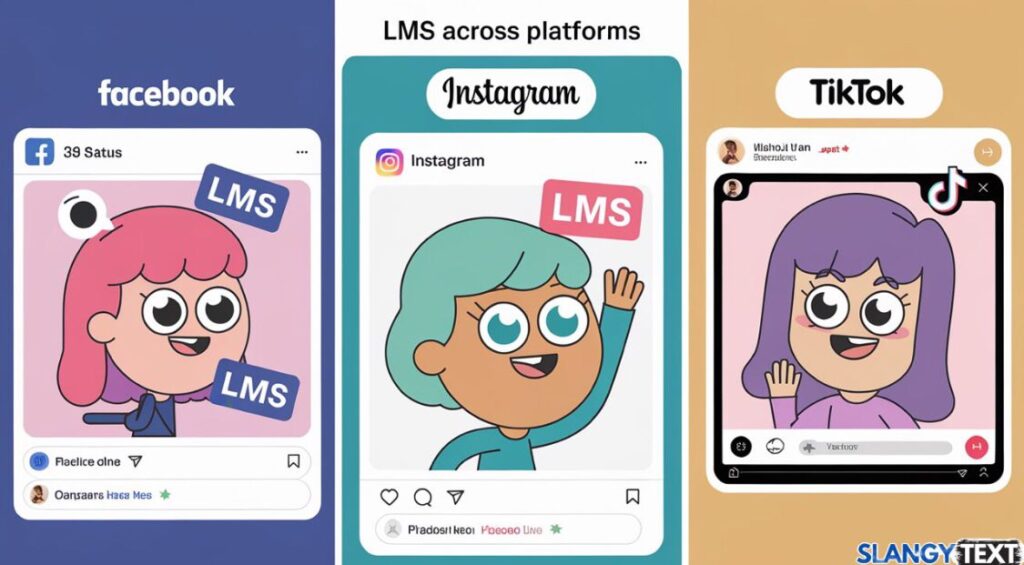
Facebook: The Birthplace of LMS
Facebook, with its status updates and wide array of reactions, remains the primary platform for LMS usage. Users often employ it to boost the visibility of their posts in friends’ news feeds.
Instagram: Visual LMS
On Instagram, LMS might be used in photo captions or stories. Users might post a new selfie with the caption “New look! LMS if you approve 💇♀️” to gauge reactions to their appearance change.
TikTok: Evolving LMS
TikTok’s unique format has given rise to new forms of LMS. Users might say “Like for Part 2” in their videos, essentially using the LMS concept to drive engagement and create series content.
The Etiquette of LMS
As with any social media trend, there are unwritten rules and considerations when using LMS:
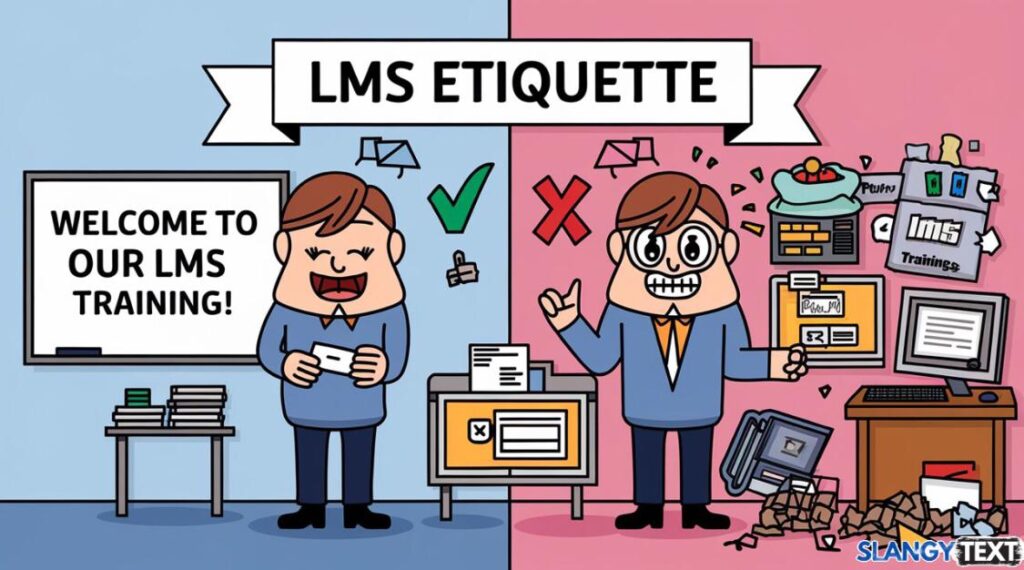
Frequency Matters
Overusing LMS can be seen as attention-seeking or desperate. It’s generally advisable to use it sparingly and for posts that genuinely warrant extra attention or interaction.
Context is Key
The appropriateness of using LMS depends heavily on the context and your audience. While it might be perfectly acceptable among friends, using it in professional settings or with older family members might not be well-received.
Reciprocity
If you frequently use LMS, it’s good etiquette to reciprocate by engaging with others’ content as well. Social media interactions work best when they’re a two-way street.
Beyond Social Media: Other Meanings of LMS
While “Like My Status” is the most common interpretation in social contexts, LMS has other significant meanings in different fields:
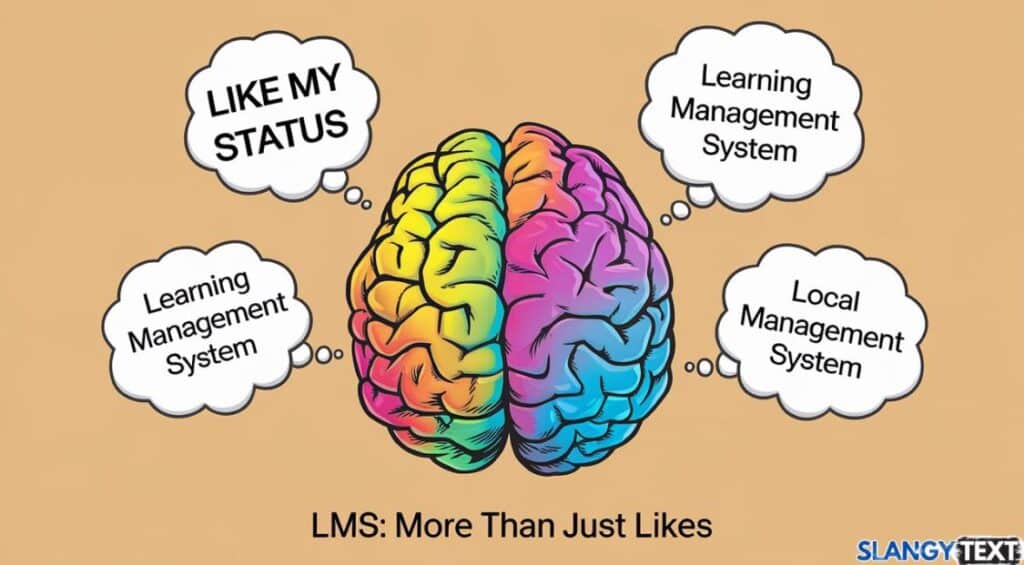
Learning Management System
In the world of education and corporate training, LMS stands for Learning Management System. These are software applications used for the administration, documentation, tracking, reporting, and delivery of educational courses or training programs.
Local Management System
In IT and business contexts, LMS can refer to Local Management System, a term used in network management and data processing.
Least Mean Square
In mathematics and signal processing, LMS stands for Least Mean Square, an algorithm used in adaptive filters.
The Evolution of Online Communication
The popularity of acronyms like LMS reflects broader trends in how we communicate in the digital age:
Efficiency in Expression
In a world where attention spans are shrinking and information overload is real, acronyms like LMS allow us to convey complex ideas or requests quickly and efficiently.
Creating In-Group Language
Using and understanding terms like LMS can create a sense of belonging among social media users, particularly younger generations. It’s a form of digital slang that evolves rapidly.
Bridging Text and Emotion
Acronyms like LMS, along with emojis and GIFs, help bridge the gap between text-based communication and the emotional nuances we express in face-to-face interactions.
The Future of LMS and Digital Communication
As social media platforms continue to evolve and new ones emerge, the way we use acronyms like LMS is likely to change:
Emerging Platforms
With the rise of new social media platforms, we might see variations of LMS tailored to their specific features and audience.
AI and Natural Language Processing
As AI becomes more integrated into our digital communication, understanding and interpreting acronyms like LMS will be crucial for these systems to accurately process human interactions.
Shifting Cultural Norms
The acceptability and usage of terms like LMS may shift as different generations dominate various social media platforms.
You might like to read this too: What Does OPOR Mean?
Conclusion: The Multifaceted Nature of LMS
From a simple request for likes to a complex learning management system, LMS exemplifies the multifaceted nature of language in the digital age. It’s a testament to how our communication styles adapt to new technologies and social norms.
Whether you’re a social media enthusiast, an educator, or simply trying to navigate the ever-changing landscape of online communication, understanding the various meanings and implications of acronyms like LMS is crucial.
As we continue to shape our digital world, it’s fascinating to observe how three simple letters can carry such diverse and significant meanings across different contexts. The next time you encounter LMS, take a moment to appreciate the rich tapestry of communication it represents in our interconnected world.
LMS in Different Contexts
Understanding the versatility of LMS requires looking at its usage across various scenarios. Let’s explore some common contexts where you might encounter this acronym:
Social Media Interactions
On platforms like Facebook and Instagram, LMS often appears in casual, friendly exchanges. Here’s a table showcasing typical LMS usage in social media posts:
| User | Post Content |
|---|---|
| Emily | “Just finished my first marathon! LMS if you’re impressed 🏃♀️🏅” |
| Jake | “New haircut, feeling fresh! LMS if you approve ✂️💇♂️” |
| Sophia | “Cooked my first Thanksgiving dinner solo. LMS if you want the recipe! 🦃🍽️” |
| Ethan | “Started my own YouTube channel! LMS if you want me to share the link 🎥” |
| Olivia | “Adopted a rescue puppy today! LMS to see more pics of this cutie 🐶❤️” |
| Noah | “Just landed my dream job! LMS to celebrate with me 🎉🥂” |
| Ava | “Feeling down today. LMS if you’re sending positive vibes my way 🙏” |
| Liam | “Thinking of dying my hair blue. LMS if you think I should go for it! 💙” |
| Mia | “First day of college tomorrow! LMS for good luck 🍀📚” |
| Mason | “Started a new fitness journey. LMS if you want updates on my progress 💪” |
Educational Settings
In academic and professional training environments, LMS takes on a different meaning. Here’s how Learning Management Systems are typically used:
| Feature | Description |
|---|---|
| Course Creation | Instructors can design and upload course materials |
| Student Enrollment | Admins can manage student access to specific courses |
| Assignment Submission | Students can submit assignments digitally |
| Grading | Automated grading for quizzes and instructor grading for essays |
| Discussion Forums | Virtual spaces for class discussions and Q&A |
| Progress Tracking | Both students and instructors can monitor learning progress |
| Resource Library | Central repository for course-related documents and media |
| Calendar | Integrated calendar for course schedules and deadlines |
| Video Conferencing | Built-in tools for virtual classroom sessions |
| Mobile Access | Apps or mobile-responsive design for on-the-go learning |
The Art of Using LMS Effectively
Mastering the use of LMS in social media requires understanding its nuances and impact. Here are some scenarios illustrating effective and less effective uses of LMS:
Effective LMS Usage
| Scenario | LMS Use | Effectiveness |
|---|---|---|
| Charity Fundraiser | “Running 5K for cancer research. LMS if you’d like to sponsor me!” | High – Clear call to action for a good cause |
| New Business Venture | “Just launched my handmade jewelry line! LMS if you’d like to see the catalog.” | Good – Engages potential customers |
| Personal Achievement | “Finally quit smoking after 10 years! LMS if you’re proud of me!” | Positive – Seeks support for personal growth |
| Community Event | “Organizing a neighborhood cleanup this Saturday. LMS if you’re interested in joining!” | Effective – Encourages community engagement |
| Creative Showcase | “Posted my first original song on SoundCloud. LMS if you want me to share the link!” | Good – Promotes artistic work respectfully |
| Travel Plans | “Planning a Euro trip next summer. LMS if you have any must-visit recommendations!” | Useful – Solicits practical advice |
| Book Release | “My debut novel is out today! LMS if you’d like info on where to purchase.” | Appropriate – Promotes work without hard selling |
| Fitness Journey | “Day 30 of my workout challenge. LMS if you want to see my progress pics!” | Motivational – Shares personal progress |
| Recipe Share | “Made Grandma’s secret lasagna recipe. LMS if you want me to post the steps!” | Engaging – Offers valuable content to followers |
| Pet Adoption | “Considering adopting a rescue pet. LMS if you have experience with animal shelters!” | Thoughtful – Seeks advice on important decision |
You might like to read this too: What Does DTN Mean?
Less Effective LMS Usage
| Scenario | LMS Use | Issue |
|---|---|---|
| Everyday Post | “Just woke up. LMS.” | Overuse – Lacks meaningful content |
| Attention Seeking | “Feeling ignored. LMS if you still care.” | Emotionally manipulative |
| Excessive Requests | “LMS for a like back!” followed by “LMS if you’re online!” | Spam-like behavior |
| Inappropriate Timing | “At a funeral. LMS if you’re here too.” | Insensitive to the situation |
| Oversharing | “Had a huge fight with my partner. LMS for details.” | Too personal for public sharing |
| Peer Pressure | “LMS or you’re not a true friend.” | Manipulative and pressuring |
| Irrelevant Context | “Important business presentation today. LMS for good luck!” | Misaligned with professional setting |
| Competitive Use | “LMS if you think I’m prettier than Sarah.” | Promotes negative comparisons |
| Guilt-Tripping | “Spent hours on this artwork. LMS if you appreciate my effort.” | Emotional blackmail |
| Excessive Frequency | Multiple posts a day all ending with “LMS” | Annoying to followers |
LMS and Digital Etiquette
Understanding the unwritten rules of using LMS is crucial for maintaining positive online interactions. Let’s explore some dos and don’ts:
LMS Etiquette Guidelines
| Do | Don’t |
|---|---|
| Use LMS for significant life events or achievements | Overuse LMS in everyday, mundane posts |
| Employ LMS to gather opinions on important decisions | Use LMS to seek validation for every small choice |
| Utilize LMS for community engagement and support | Apply LMS in a way that pressures or guilt-trips others |
| Balance LMS requests with engaging, LMS-free content | Make every post an LMS request |
| Use LMS to promote charitable causes or community events | Exploit LMS for purely commercial gain |
| Apply LMS creatively in polls or interactive content | Use LMS in a way that could be seen as attention-seeking |
| Respect platform-specific norms when using LMS | Use LMS inappropriately in professional or formal contexts |
| Reciprocate by engaging with others’ LMS requests | Ignore others’ content while frequently using LMS yourself |
| Use LMS to showcase personal growth or achievements | Use LMS to make unfair comparisons or put others down |
| Be mindful of your audience when using LMS | Assume everyone understands or appreciates LMS usage |
You might like to read this too: What does MK Mean In Texting?
The Impact of LMS on Digital Communication
The widespread use of acronyms like LMS has significantly influenced how we interact online. Let’s examine some of these impacts:
LMS and Communication Trends
| Trend | Description | Impact |
|---|---|---|
| Brevity in Expression | LMS encapsulates a request in just three letters | Enables quick, efficient communication |
| Engagement Metrics | LMS directly ties to measurable interactions (likes) | Quantifies social approval and engagement |
| Digital Dialects | LMS as part of evolving online language | Creates in-group understanding and digital fluency |
| Call-to-Action Culture | LMS as a prompt for specific user actions | Encourages active participation in social media |
| Emotional Shorthand | LMS as a way to request emotional support | Facilitates expression of needs in digital spaces |
| Content Strategy | LMS influencing how users craft their posts | Shapes content creation with engagement in mind |
| Platform Features | Platforms adapting to accommodate LMS-like behaviors | Influences development of social media features |
| Generational Divide | Different age groups varying in LMS understanding and use | Highlights generational gaps in digital communication |
| Privacy Considerations | LMS potentially exposing personal feelings or situations | Raises questions about online privacy and oversharing |
| Social Validation | LMS as a tool for seeking peer approval | Reflects and reinforces desire for social acceptance |
LMS Beyond Social Media
While “Like My Status” is the prevalent meaning in social contexts, LMS carries significant weight in other domains, particularly in education and professional development:
Learning Management Systems in Education
| Feature | Application | Benefit |
|---|---|---|
| Course Management | Organizing curriculum and materials | Streamlines educational content delivery |
| Student Tracking | Monitoring progress and engagement | Enables personalized learning experiences |
| Assessment Tools | Quizzes, exams, and assignment submissions | Facilitates diverse evaluation methods |
| Communication Platforms | Discussion forums and messaging systems | Enhances student-teacher interaction |
| Resource Libraries | Centralized storage for educational materials | Improves access to learning resources |
| Analytics | Data on student performance and course efficacy | Aids in continuous improvement of courses |
| Mobile Learning | Access to courses via smartphones and tablets | Supports learning on-the-go |
| Collaboration Tools | Group projects and peer review features | Encourages collaborative learning |
| Certifications | Automated certificate generation upon course completion | Simplifies credential management |
| Integration Capabilities | Connecting with other educational tools and platforms | Creates a comprehensive learning ecosystem |
Conclusion:
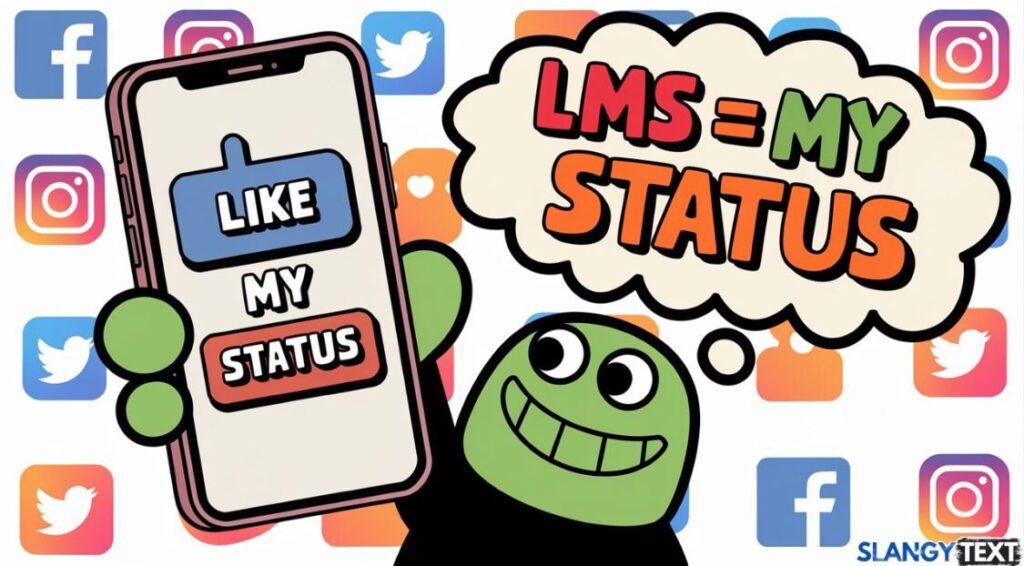
In conclusion, LMS in texting primarily means “Like My Status,” reflecting the desire for social media engagement and validation. This acronym has become a significant part of online communication, especially among younger users on platforms like Facebook and Instagram. While it serves as a quick way to request interaction, its usage requires consideration of context and frequency to maintain positive digital etiquette. Beyond social media, LMS also holds important meanings in educational and professional settings as “Learning Management System.” As digital communication continues to evolve, understanding and appropriately using acronyms like LMS will remain crucial in navigating our increasingly connected world.
You might like to read this too: What Does NTM Mean?

Kayla Rogers is a writer at Slangy Text who loves exploring modern acronyms & slangs and how they shapes our conversations. She enjoys sharing fun and interesting articles that connect with readers. When she’s not writing, Kayla likes to keep up with the latest trends or relax with a good book.

